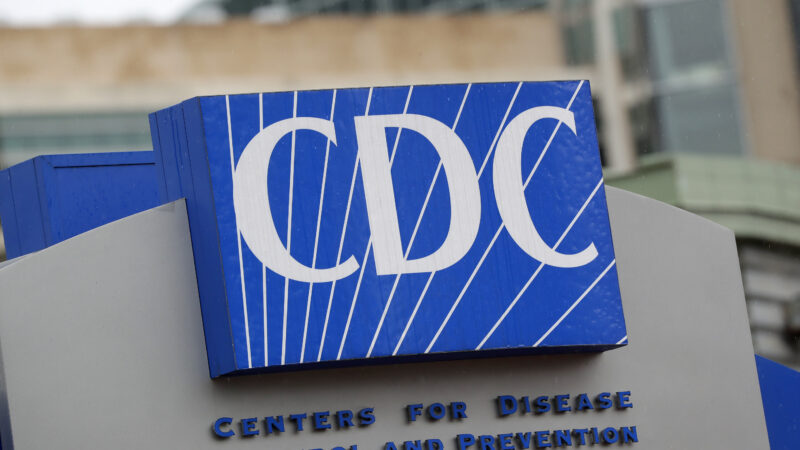New CDC report finds ‘significant increase’ in children diagnosed with developmental disorders
The Centers for Disease Control and Prevention is shown Sunday, March 15, 2020, in Atlanta. (AP Photo/John Bazemore)
The rate of diagnoses for developmental disabilities in children ages 3-17 years old in the U.S. is on the rise, according to a new report from the Centers for Disease Control and Prevention’s National Center for Health Statistics (NCHS).
The NCHS report provides updated estimates for diagnosed autism spectrum disorder, intellectual disability and other developmental delay. The findings, collected from the newly-redesigned National Health Interview Survey (NHIS), show that during 2019-2021, there was a “significant increase” in the prevalence of any diagnosed developmental disabilities — a broad term that can include delays in physical movement, language, social awareness and cognition — from 7.4% to 8.56%.
The data also reveals no significant change in diagnoses for autism spectrum disorder or intellectual disability over the same period. Intellectual disabilities are somewhat based on IQ, so if you have below a certain score, you’d be considered to have an intellectual disability. One of the most common examples is Down syndrome, but children with an intellectual disability can also be diagnosed with autism spectrum disorder.
While the results showing an increase in rates may seem alarming, researchers say it could be a sign of better access to mental health services.
“I do think it’s indicative of how some historically underserved groups might be getting services and getting diagnoses who didn’t in the past,” said Dr. Ben Zablotsky, an epidemiologist at the CDC and a lead author of the report. “I do think it’s actually encouraging.”
Zablotsky also said it’s not surprising to see higher rates of diagnoses as awareness of the conditions increase, and he pointed to another report released in March from the Autism and Developmental Disabilities Monitoring (ADDM) Network which found an increase in diagnoses of autism spectrum disorder but attributed the changes to improved screening, awareness, and mental health services.
While it’s not something they looked at for their report, Zablotsky said those findings could apply here. Ultimately, he believes the findings of both reports underscore the need for more mental health screening services.
“Developmental disabilities are common and they are still increasing,” he said. “A lot of that increase might be related to other developmental delays that aren’t autism spectrum disorder or intellectual disability. But I don’t think that takes away from the importance of early screening getting services. Detection is still very important.”
The new report’s estimates are the first on developmental disabilities from the NHIS since the survey was redesigned in 2019. Researchers interviewed respondents in their homes, while sometimes conducting follow-ups over the phone. Because of the COVID-19 pandemic, interviewing procedures were disrupted, so most of the initial interviews conducted in 2020 and 2021 were done, at least in part, by phone.
Results show higher rates for each selected condition compared to a previous report that looked at data from 2014-2016. However, because the questionnaire used in the interviews was changed as part of the redesign, the estimates may not be comparable.
- Other key findings from the report include:
- the prevalence of any developmental disability was lowest in non-Hispanic Asian children compared with other race and Hispanic-origin groups
- the prevalence of intellectual disability increased with age, while the prevalence of other developmental delays decreased with age
- boys were more than three times as likely to be diagnosed with autism spectrum disorder than girls — 4.66% compared to 1.5%.
Additionally, the report did not find Black and Hispanic children to be more likely to be diagnosed with autism spectrum disorder compared with white children, unlike other recent reports.
This story was produced by the Gulf States Newsroom, a collaboration between Mississippi Public Broadcasting, WBHM in Alabama, WWNO and WRKF in Louisiana and NPR. Support for health equity coverage comes from The Commonwealth Fund.
U.S. and Iran to hold a third round of nuclear talks in Geneva
Iran and the United States prepared to meet Thursday in Geneva for nuclear negotiations, as America has gathered a fleet of aircraft and warships to the Middle East to pressure Tehran into a deal.
FIFA’s Infantino confident Mexico can co-host World Cup despite cartel violence
FIFA President Gianni Infantino says he has "complete confidence" in Mexico as a World Cup co-host despite days of cartel violence in the country that has left at least 70 people dead.
Supreme Court appears split in tax foreclosure case
At issue is whether a county can seize homeowners' residence for unpaid property taxes and sell the house at auction for less than the homeowners would get if they put their home on the market themselves.
Top House Dem wants Justice Department to explain missing Trump-related Epstein files
After NPR reporting revealed dozens of pages of Epstein files related to President Trump appear to be missing from the public record, a top House Democrat wants to know why.
ICE won’t be at polling places this year, a Trump DHS official promises
In a call with top state voting officials, a Department of Homeland Security official stated unequivocally that immigration agents would not be patrolling polling places during this year's midterms.
Cubans from US killed after speedboat opens fire on island’s troops, Havana says
Cuba says the 10 passengers on a boat that opened fire on its soldiers were armed Cubans living in the U.S. who were trying to infiltrate the island and unleash terrorism. Secretary of State Marco Rubio says the U.S. is gathering its own information.







